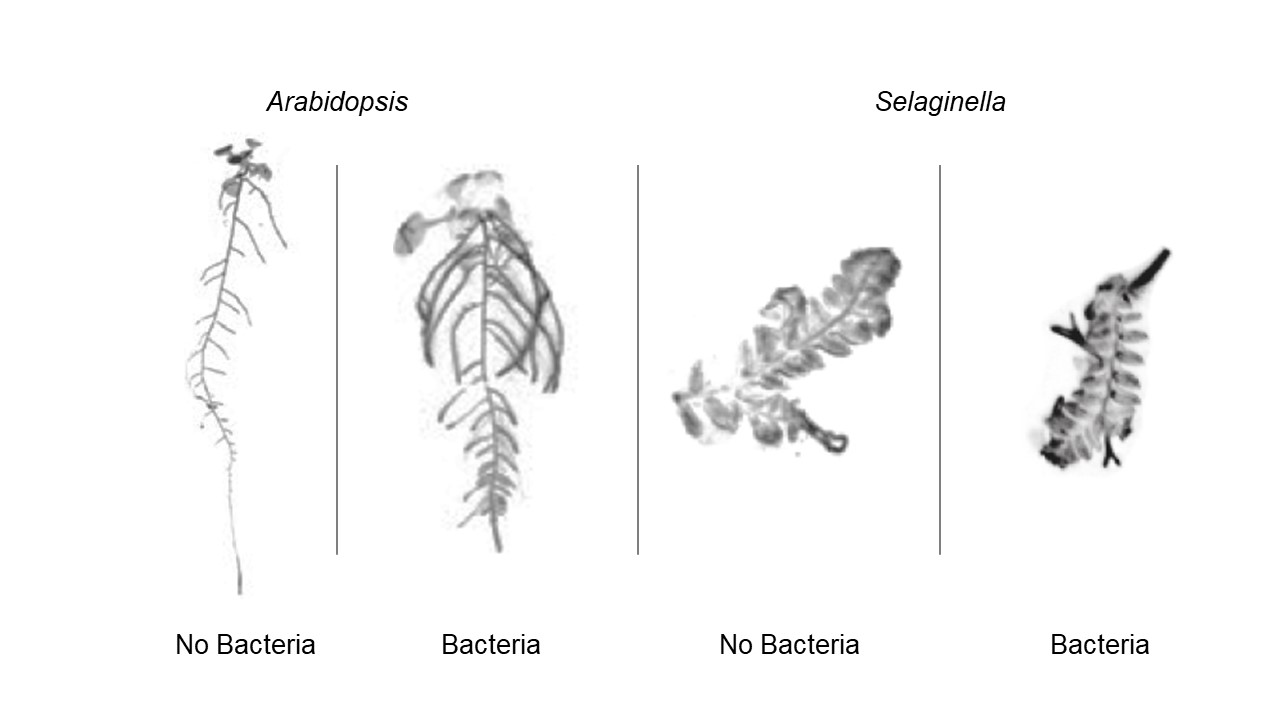Monday, 03 April 2023
Researchers have revealed for the first time how a mechanism that controls root development in plants enables them to cope better with environmental stress conditions.
A team of plant scientists from the University of Nottingham have discovered a novel regulatory mechanism that shows how plant microbiota harmonizes with plant roots to control their branching. The findings have been published in the Proceedings of the National Academy of Science.
Plants growing in natural ecosystems live alongside a multitude of microorganisms - virus-like particles, bacteria, fungi, and oomycetes)– these are known as the microbiota. Some of these microbes help plant growth and others can have a detrimental effect, a balance among them is essential to guarantee plant health.
 Image illustrating roots with and without Bacteria present
Image illustrating roots with and without Bacteria present
In this study researchers found that the plant microbiota regulates root architecture in the model plant Arabidopsis thaliana, allowing plants to adapt their roots to better take up water and nutrients from the soil in changing environments.
This discovery significantly advances current knowledge on how plants integrate microbial function into mechanisms of root branching and could guide future microbial-based solutions to increase food production in eroded, and nutrient-poor soils, where plant performance relies on root function.
Identifying this alternative microbiota-driven mechanism will allow us to optimize the shape of the root system, using microbial-based approaches, to increase its capacity for water and mineral nutrients uptake, plant anchorage, and also interaction with beneficial soil microbiota in response to climate change.
The results are great relevance, Mathieu continued, because finding microbiota-driven pathway of root branching plasticity in natural ecosystems when microbes are omnipresent could be the starting point to study the interactions among the other distinct regulatory branches of root branching (auxin, nutrients, and the immune system) contributing to the integration of environmental cues, both biotic and abiotic, into the endogenous developmental program to modulate lateral root plasticity.
The Leverhulme Trust, the Royal Society and the University of Nottingham Future Food Beacon of Excellencesupported this research.
Story credits
More information is available from Mathieu Gonin on mathieu.gonin@nottingham.ac.uk
Notes to editors:
About the University of Nottingham
Ranked 97 in the world and 17th in the UK by the QS World University Rankings, the University of Nottingham is a founding member of Russell Group of research-intensive universities. Studying at the University of Nottingham is a life-changing experience, and we pride ourselves on unlocking the potential of our students. We have a pioneering spirit, expressed in the vision of our founder Sir Jesse Boot, which has seen us lead the way in establishing campuses in China and Malaysia - part of a globally connected network of education, research and industrial engagement.
Nottingham was crowned Sports University of the Year by The Times and Sunday Times Good University Guide 2024 – the third time it has been given the honour since 2018 – and by the Daily Mail University Guide 2024.
The university is among the best universities in the UK for the strength of our research, positioned seventh for research power in the UK according to REF 2021. The birthplace of discoveries such as MRI and ibuprofen, our innovations transform lives and tackle global problems such as sustainable food supplies, ending modern slavery, developing greener transport, and reducing reliance on fossil fuels.
The university is a major employer and industry partner - locally and globally - and our graduates are the third most targeted by the UK's top employers, according to The Graduate Market in 2024 report by High Fliers Research. Alongside Nottingham Trent University, we lead the Universities for Nottingham initiative, a pioneering collaboration between the city’s two world-class institutions to improve levels of prosperity, opportunity, sustainability, health and wellbeing for residents in the city and region we are proud to call home. More news…